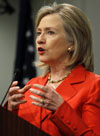
In an important speech on foreign policy at the Council on Foreign Relations yesterday, Secretary of State Hillary Clinton only spent a few minutes on U.S. policy toward Sudan (thanks to Travis Atkins, a fellow at CFR, who posed a question). But what she did say regarding North-South issues – “the situation… is a ticking time bomb” – provoked a torrent of follow-up questions when a State Department spokesperson held his daily briefing with reporters.
The State Department sought to step away from the suggestion that war in Sudan was “inevitable,” but the press secretary continued to convey a sense of urgency. “We are very mindful that if, for some reason, full implementation of the CPA is not forthcoming, or if the referendum is not seen as credible, there certainly is the risk of further conflict,“ he said.
As someone who peruses the press briefing transcript daily, I can say this is the most attention directed at Sudan from D.C. journalists in recent months, and the fact that it led off the press secretary’s updates is also significant.
Encouragingly, press secretary PJ Crowley revealed that following Secretary Clinton’s remarks at the Council on Foreign Relations, she spoke by phone with Sudanese Vice Presidents Ali Osman Taha (from the North) and Salva Kiir (from the South) to “encourage and accelerate this process” of preparing for the referendum, set to take place on January 9, 2011. When asked whether Clinton discussed specific potential consequences with Taha, in the event that Sudan’s ruling party obstructs the preparation or meddles with the outcome of the referendum, Crowley’s vague response about “seeing some steps taken” suggested she did not. Regardless, this high-level, one-on-one engagement is a positive indication that the Obama administration is ready to ramp up its involvement during these crucial final four months leading up to the referendum.
Plans are underway for a meeting of heads of state on the sidelines of the U.N. General Assembly later this month to discuss Sudan’s referendum. Secretary-General Ban Ki-moon plans to attend and, notably, has reportedly committed to staying for a full hour. The Washington Post’s Colum Lynch went public with news (via Twitter) that President Obama would also attend, though it is unclear whether he’ll take part substantively in the discussions or simply stop by to meet and greet.
In response to the news of President Obama’s planned participation in the meeting, Sudan advocacy groups commended the direction U.S. policy seems to be heading, even at this late hour. Acknowledging the U.S. diplomatic efforts already taking place, a joint statement issued by the groups this morning noted that President Obama will be able to “push for bolder benefits and meaningful consequences” to ensure that the referendum is held on time and carried out in a credible way that helps avoid “what could be the world’s largest conventional conflict next year.” But, they added, “the carrots and sticks must be robust enough to grab the attention of the parties, particularly the National Congress Party.”
Time will soon tell whether this flurry of activity surrounding Sudan lives up to the “all hands on deck” approach Secretary Clinton described yesterday. (Glaringly absent from these recent conversations is the worrisome situation in Darfur and its all-but-dead peace process.) The new lead U.S. diplomat charged with overseeing negotiations between North and South, Ambassador Princeton Lyman, arrived in-country at the end of August, and expectations are high that he’s got the track record and chutzpah to help light a fire under the two Sudanese parties during this short period of time.
Here’s to hoping that the burst of attention to Sudan – from both the Obama administration and journalists covering U.S. foreign policy – signals that the Sudan issue has reached a tipping point, with just four months to go until the historic vote and much to do in the meantime.
Photo: U.S. Secretary of State Hillary Clinton speaks at the Council on Foreign Relations (AP)

